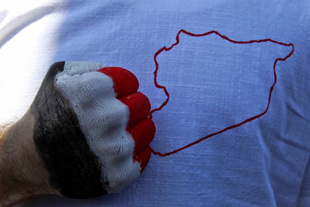Syria Amid Revolution and Reform

 IRD: When Bashar al-Assad came to power in 2000, following his father Hafez, he was considered a young, British-educated man who had more progressive views compared to his father’s generation. He made a number of promises to bring about changes in Syria and he acted on some of them. However, he was heir to decades of security governance. Baath leaders gradually influenced Assad and he eventually backed off from his reformist attitude and followed in his father’s footsteps. After a decade, when we look back it seems that if he had continued the reforms he would not be facing a wave of popular protests in the streets of Dar’a, Hams and Damascus.
IRD: When Bashar al-Assad came to power in 2000, following his father Hafez, he was considered a young, British-educated man who had more progressive views compared to his father’s generation. He made a number of promises to bring about changes in Syria and he acted on some of them. However, he was heir to decades of security governance. Baath leaders gradually influenced Assad and he eventually backed off from his reformist attitude and followed in his father’s footsteps. After a decade, when we look back it seems that if he had continued the reforms he would not be facing a wave of popular protests in the streets of Dar’a, Hams and Damascus.It is true that this wave of protests began in Tunisia and then spread to Egypt and Libya and other Arab countries, and now it has spread to Syria as well, but we must not forget that Syria is different in some aspects compared to other Arab countries. The existence of an international atmosphere and the way Bashar al-Assad is perceived by regional and world powers is significant.
It is evident that Syria hasn’t been successful in its domestic policies, since it has ignored the rights and demands of its own people, in what is a common factor between Syria and other Arab countries. However, Syria has been successful in its foreign policy--in other words, Syria is the only Arab country which has supported the Resistance against Israel. It is true that Syria has not entered into any direct conflict with Israel for many years, but meanwhile it has supported Palestinian groups, therefore gaining a considerable amount of respect among Muslims.
Even though Syria has anti-Israeli stances, it has also been able to gain the attention of the EU- and even the US- through its active diplomacy. Therefore, in the current situation the EU and the United States do not want Bashar al-Assad to be removed from power. In addition to world powers, influential regional countries also do not want Bashar al-Assad’s regime to change. Syria is Iran’s ally, and therefore Iran does not support regime change in Syria. Saudi Arabia is also against any change in the region, because they think that these changes could soon affect them as well.
Therefore, Bashar al-Assad is at a minimum defendable in his foreign policy. It is very likely that he will remain in power if he is able to achieve some success in his domestic policies and fulfills the promises he has made, taking steps in realizing the demands of his people. In other words, in the current Middle East situation and with the Arab- Israeli conflict and the threat of radical Islamist groups in Syria, if the state of emergency is removed, a one-party government is dismantled, freedom of media is achieved, and the security forces who have cracked down on people are put on trial, Bashar al-Assad might be able to put an end to the current crisis.
Last week we witnessed signs of reform by Bashar al-Assad. At least in his second speech he showed signs of wisdom and accepted some of the realities in Syria. In this speech he called all- including the police and the protesters- martyrs, which showed his respect for the protesters and which was unprecedented. One of the major signs of reform is the dismantlement of the state of emergency law, which was established half a century ago in Syria and was one of the main demands of the protesters.
Our media has made a big mistake in not covering the Syrian conflict; it has actually fallen behind the Syrian media in covering the issue. The Syrian media, albeit late, did cover the people’s protests against Bashar al-Assad. When an important event- like the Syrian protests- take place around the world and our media doesn’t cover it, it shows our lack of vision and understanding of media concepts. The most important duty of any media is providing information with impartiality, but media turns into a propaganda device when news is treated the way that it is in our media today. These actions by our media distort its image and even undermine our government’s positions. Therefore, having double standards- what is our accusation against the US- is exactly what we are applying ourselves.
The best possible policy for Iran in the current situation is to advise Bashar al-Assad to comply with the demands and the rights of his people, and seriously apply reforms in his government.

